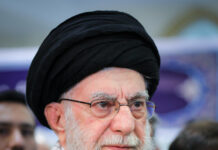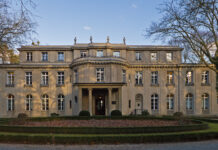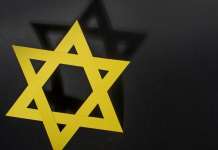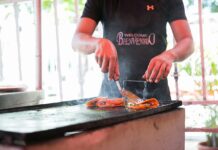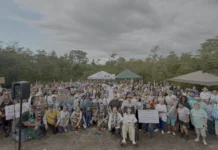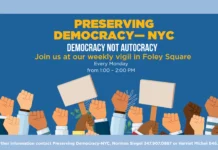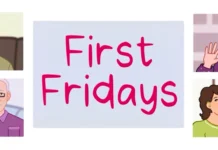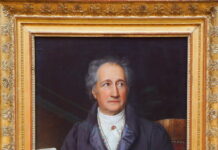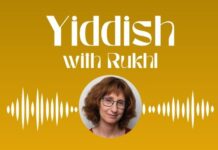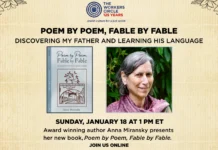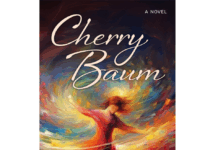This bit of news is only funny because for most of my life I believed, with good reason, that I was a Jew.
It’s a story, but we have time.
My father left home when he was 13 and never returned. Raised on a farm in Oregon, he found his way to southern California and spent several years working at a Chinese dairy. Thus, he spoke some Spanish and a little Cantonese and ate with chopsticks.
He was also — and this is the point of our story — a Jew.
Before proceeding, I’ll warn you that all or most of the above is likely a lie. But I digress.
By age 13, I was aware of my Jewishness. The heavy mantle of 6,000 years of history was on my shoulders and I was not about to stand defiantly in its path.
I began a year of Jewish studies at the local synagogue, joined the American Federation of Temple Youth and enjoyed feeling smug about belonging to the Chosen People, picking up some useful Yiddish along the way. My family refers to this as my “Jewish phase.”
For the next 40 years I was, if not Jewish, at least a Jew. I took fast and firm umbrage against any anti-Semitism, real or perceived. I felt guilty if I ate pork and I fretted about persecuted peoples in general.
After meeting my husband in 2013, we arranged a trip to the Ronald Reagan Presidential Library in Simi Valley, California, and invited my brother Bob and his wife Georgi. It was a perfect evening; a big band dinner dance with Reagan’s Air Force One — the actual plane — towering above us. The grandeur of the place is something to behold.
The evening was full of getting-to-know-you small talk and shared memories between two old sailors as boyfriend and brother hit it off.
Heading to the dance floor, I mentioned something about so many of the great big band leaders being Jews — think Benny Goodman, Buddy Rich, Artie Shaw, Herb Alpert — and somehow ended the comment with me knowing that “because, you know, I’m Jewish.”
Time stopped. Right. There.
Bob, seated, narrowed his eyes and cocked his head ever so slightly. He paused before speaking, as if carefully collecting his thoughts before proceeding.
“Sister,” he said slowly, “what makes you think you’re Jewish?”
My brother Bob knows nearly everything, so the question was not insignificant.
“Well,” I began, “Dad was a Jew. His family in Oregon were Jews.” The room was spinning a little.
The family genealogy buff looked amused as he dropped the bomb. “Dad wasn’t from Oregon. And he definitely wasn’t Jewish.”
Standing there awkwardly, I could feel my cultural identity dribbling out onto the floor.
I didn’t — couldn’t — move from my standing position. Why had my father told only me? Why hadn’t he shared this with my four brothers? Why hadn’t I? My father was long deceased and certainly not available to attest to my claim. This was “mishegas” (craziness).
“Let’s check with the others,” Bob said.
My brothers and I are very close and they are genuinely my four favorite guys on the planet. He got Jerry in Iowa on the phone.
“Hey brother, quick question. Where was Dad from?” Bob asked. Jerry’s quick response: “Bakersfield, California.”
The next call was to Rick in Fresno: “I’m pretty sure he was from Los Angeles.”
Finally, it was Sam’s turn to weigh in: “Dad was born and raised in Texas. He told me all about it.”
So, there you have it. None of us really knew anything about my father. Except Bob.
We lived in Phoenix for about a year when I was 4 or 5. I have one blurry memory of a woman in an old green station wagon, talking to my father through the open window and then driving off in the Arizona dust.
“That woman was your grandmother,” Bob said. “Dad’s family were pig farmers in Arizona.”
Raising pigs in the desert is about as far from farming crops in Oregon as one can get. I was gobsmacked, overcome, stunned — “verklempt.”
The next thing I’ll learn, I thought, is that he didn’t really date Marilyn Monroe. (He did. She was my mom’s classmate in high school and her name was Norma Jean Baker.)
So, there you have it. Not a Jew. Not even close. In the aftermath of having the culture smacked out of me, I began to reflect on the beliefs that make us who we are, or rather who we think we are. No longer Jewish, my views on Middle East politics began to evolve.
Had my cultural identity defined my world viewpoint? And if that viewpoint changed when my identity shifted, what does that say about the strength of our convictions? Do unseen forces, historical pressures hundreds or even thousands of years old, dictate our social behavior more than we’d like to admit?
So, here I am, your average non-Jewish woman, a “shiksa.” BLT on white toast, black pepper, plenty of mayo. Surely if God hadn’t intended for us to eat pigs, he wouldn’t have made them so delicious.
Minus the guilt, they’re even better.




